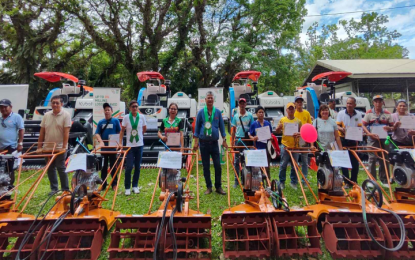
MECHANIZATION. Farmers receive agricultural machines under the Rice Competitiveness Enhancement Fund mechanization program in Kidapawan City on Feb. 29, 2024. The Philippine Center for Postharvest Development and Mechanization on Tuesday (Oct. 8) expressed support to the proposed PHP9-billion annual allocation for the mechanization program under the extended Rice Competitiveness Enhancement Fund to increase mechanization coverage and boost rice production. (Photo from PHilMech website)
MANILA – The Philippine Center for Postharvest Development and Mechanization (PHilMech) on Tuesday said the proposed PHP9-billion annual allocation for the mechanization program under the Rice Competitiveness Enhancement Fund (RCEF) will help boost local rice yield.
PHilMech expressed support for the proposed annual fund for the distribution of various agricultural equipment, either in-kind or grants, to qualified farmers cooperatives and associations (FCAs) under the extended RCEF.
“With PHP9 billion annually for another six years, the RCEF-Mechanization Program can cover up to 30 percent more rice farms, which will result in around 44 percent mechanization coverage for rice farms nationwide by 2031,” PHilMech Director Dionisio Alvindia said in a statement.
The proposal is higher than the PHP5 billion yearly allocation for the distribution of farm equipment since 2019 under the Republic Act 11203 or the Rice Tariffication Law.
Alvindia said the increased funding will help lower rice imports, as only 14 percent of rice farms in the Philippines were covered during the program’s implementation from 2019 to 2024.
Besides increased coverage, the RCEF-Mechanization program extension is also expected to enable the PHilMech to establish more modern drying and milling facilities or rice processing centers; bid, procure, and distribute more farm machinery to FCAs; and train more FCAs and local government units (LGUs) for the utilization of farm machinery, among others.
“The provision of modern drying and milling machines to qualified FCAs and LGUs will also make it possible for them to directly market their milled rice at the retail level, or to big institutions,” Alvindia said.
The PHilMech chief said extending the RCEF will play a key role in the continuous modernization of Philippine agriculture.
“When the RCEF-Mechanization Program kicked off in 2019, most Filipino rice farmers were hesitant to mechanize their operations as they were used to the traditional farming methods for many decades,” Alvindia said.
"However, PHilMech is getting numerous accounts and witnessing a shortage of farm labor in many regions. This makes the need to mechanize rice farming imperative.”
As of March, at least 6,385 FCAs with almost 1 million members have received farm machinery from the PHilMech.
These include the distribution of land preparation machines, crop establishment technologies, harvesting, and threshing equipment, as well as drying and milling technologies, among others, obligating at least PHP24.9 billion of the Rice Fund for the procurement of various agricultural equipment. (PNA)
